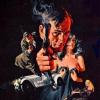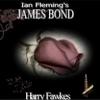Writing 101- collected by MI6 member Lethal Weapon
11,000 baby names- a site for names. Note that they are not always accurate on nationality.
Wikitravel- A good resource for (real life) locations.
50s and 60s fashion- This site is for 50s and 60s fashion for women. A good resource for period pieces.
Firearms- This wikipedia article explains the basics of firearms, how they work, etc.
Assault Rifles- A list of assault rifles.
Machine Guns- A list of machine guns.
Semi-automatic Pistols- A list of semi-automatic pistols.
Submachine Guns- A list of submachine guns.
The Universal Currency Converter- This currency converter even converts obsolete currency(like francs).
The CIA World Fact Book- This site has a lot of info, but it is a useful resource if you know what you are looking for.
Merriam-Webster Online- A dictionary that seems to also embrace "queen's" English as well as American English.
Free online Thesaurus
The Elements of Style by William Strunk Jr.
The Science Fiction and Fantasy Writers Association of America Articles on Writing
Dr Wicked's Write or Die
Conversion.ws- Converts anything that you want from Length, distance, weight, speed, temperature, Morse code to and from text, and even currency.
Book Recommendations:
Ambler recommends:
The Seven Basic Plots by Christopher Booker
Edited by Sanji Himura, 19 December 2009 - 12:49 AM.







